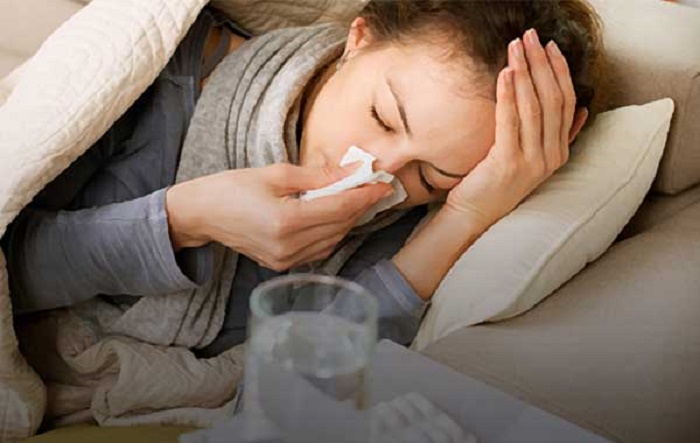First, you need to accept the reality of the situation: Germs spread like wildfire in an office or other common space. “When people sneeze, cough or even talk, they are spreading little droplets that can contain influenza and other viruses,” Romney M. Humphries, Ph.D., section chief of clinical microbiology and an assistant professor in the department of pathology and laboratory medicine at the David Geffen School of Medicine at UCLA, tells SELF. These droplets become airborne and then settle on surfaces. Depending on what virus or bacteria a person has, you may not even need to interact with them to catch their germs in a shared space. Some bacteria and viruses, like the flu, for example, can survive on hard surfaces for at least a day, Humphries says. “Other viruses and bacteria don’t do well once they are outside the human body, and die quickly in the environment.”
Instead of accepting that you’ll just become sick and miserable, here are six things you can do to avoid getting sick when everyone you know is.
1. Wash your hands more.
“This is the best way to remove germs, avoid getting sick, and prevent spread of germs to others,” Humphries says. (Follow these steps to make sure you’re doing it effectively.) The goal is to kill any germs you touch before they make their way to your mucous membranes—eyes and nose—where they can set up shop and make you ill. If you can’t get up and wash your hands easily throughout the day, “using an alcohol-based hand sanitizer is a good alternative,” says Humphries.
2. Avoid touching your face.
Specifically, your eyes and nose. Touching germs and then these areas gives said germs easy access into your body. So wash those hands and avoid the temptation to touch to make it harder for them to find an entry point.
3. Wipe down your work surface.
“This will help prevent the buildup of germs and reduce the chances of you getting exposed,” Humphries explains. Use a disinfecting wipe to clean off your workspace twice a day in the middle of flu season.
4. Get vaccinated.
This only helps with the flu, not a cold or other random viruses. But the flu is kind of a big deal. “This is the easiest, most effective way to protect yourself against getting sick,” Humphries says. “Flu vaccines cause your body to make antibodies against the flu. It’s important to get vaccinated annually, because the flu viruses change a lot year-to-year, and last year’s vaccine will not protect you.” It’s still possible to get the flu if you’ve been vaccinated, but it’s often much milder.
5. Get more sleep.
Having a healthy immune system that helps your body fight off invading germs is another important way to stay healthy. “In general, trying to live a healthy lifestyle can improve your immune system and help prevent you from getting sick,” Humphries says. One important part of that is getting enough sleep. “The number one thing you could be doing is getting enough sleep,” Anthony Lyon, M.D., medical director of The Ash Center in NYC, tells SELF. When you don’t prioritize sleep and push yourself too hard, your body is less prepared to fight back against bacteria and viruses, and you get sick more easily. If you’re a restless sleeper or have trouble winding down at night, Lyon suggests practicing deep-breathing meditation.
6. And remember that healthy habits = healthy life.
Eating healthy and exercising regularly can also have a positive impact on your immune system and put you in the best position possible to stay healthy. So when everyone around you is ill, let that be a reminder to keep up with your fitness routine (yes, even when it’s cold outside) and fueling your body for the good fight. Don`t overdo it, though. Pushing yourself too hard can actually run down your immune system and make you more susceptible—so no two-a-days, OK?
Even if you do all of these things, chances are you’re not going to make it through these months completely unscathed. Humphries points out that this is especially true if you have kids. If and when you do get sick, focus on taking care of yourself (read: lots of sleep and tea) and don’t be afraid to use your sick days if you have them. “Taking the time off to get better will help you get better sooner and miss less work in the long run,” says Humphries.
More about:
















































